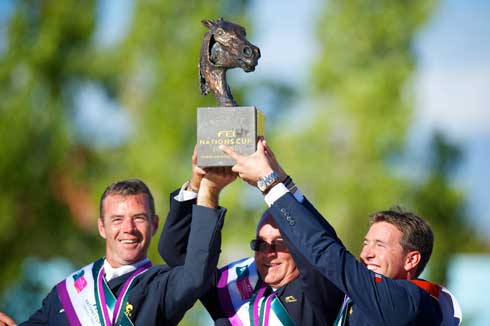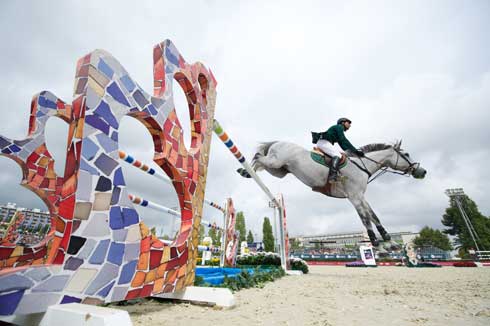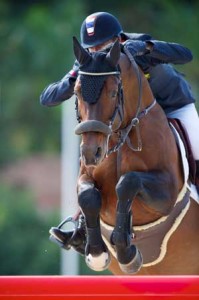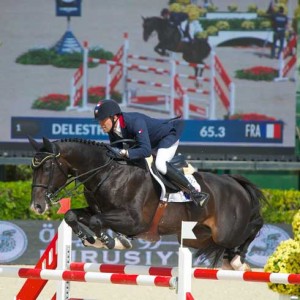France Wins Furusiyya Cup
By Staff Report September 29, 2013
Simon Delestre, team manager Philippe Guerdat and Aymeric de Ponnat celebrate the French team victory in the 2013 Furusiyya FEI Nations Cup. (Photo by Arnd Bronkhorst / FEI)
France has won the Furusiyya FEI Nations Cup Jumping Final, marking a climactic close to the first-ever season of the Fédération Équestre International’s newly-configured Nation’s Cup series, now one of the richest circuits in the world thanks to a four-year pledge of support by the Saudi Equestrian Fund.
From Sept. 26-29 the Olympic arena of the Real Club de Polo de Barcelona, became the global epicenter of show jumping as eight months of top-rung international team sport wound to a close after stops in 22 cities with a final that took place under the 102nd CSIO5* Barcelona. Total prize money for the four-day event was just over $3 million (€2,310,500), with nearly $2.7 million earmarked solely for the final.
According to Wikipedia, Furūsiyya is “the historical Arabic term for knightly martial exercise during the Mamluk period in particular, especially concerned with equestrianism.” According to the FEI, it’s the world’s most lucrative mounted team event. And by unanimous consent it was riveting sport.
Brazil finished second ahead of Ireland in third, while the Dutch lined up fourth, edged out by just over a single second when finishing on the same score as their Irish rivals. Belgium finished fifth ahead of Canada in sixth, Ukraine in seventh with Great Britain eighth and last among finalists.
USA Misses Cut
The U.S. had a bit of bad luck, finishing in ninth place among 18 countries represented in Friday’s qualifier, which put them just one rung short of stepping up to the Sunday, Sept. 29, final. It was also a surprising disappointment for the Brits, fresh from their 2012 Olympic Team Gold medal. But things didn’t go their way from the outset, with William Funnell’s Billy Congo withdrawn on Friday morning after picking up an injury and today’s 21-fault total leaving them well out of contention for top honors.

RH Prince Abdullah Bin Miteb and Davos of team Saudi Arabia fly over the Gaudi fence in the Consolation Class, open to those who were eliminated in round one. (Photo by Arnd Bronkhorst / FEI)
On the flip side, the fact that the grueling contest was able to shake-up the status quo a bit made for thrilling sport, as a total of 18 countries battled to be named the world’s best. And as the FEI’s Louise Parks pointed out, British anchorman and Olympic and European team gold medalist Scott Brash “had plenty to celebrate,” claiming half of the $270,000 (€200,000) bonus for riders who jumped double-clear over the two final rounds for his tours on Ursula. Canada’s Eric Lamaze claimed the other half, riding Powerplay.
The Netherlands’ Jeroen Dubbeldam was presented with the “Furusiyya Rider of the Final” award which was decided by former world number two ranked professional tennis player, Conchita Martínez, and former Grand Prix motorcycle road racer, Àlex Crivillé from Spain. The award was presented by Saudi Equestrian Team Director Sami Al Duhami. The U.S. won Sunday’s Consolation Round.
Spanish designer Santiago Varela’s courses became quite the topic of discussion throughout the weekend. Starting them out over a 1.55m vertical, the track veered right to a 1.55m oxer, then left to a long line of four related obstacles that began with the 1.60m vertical at fence three.
The 1.55m x 1.60m oxer at fence four fell just once during the afternoon while the following open water claimed only one victim also, Ukraine’s Ulrich Kirchhoff whose mare, Carlina, made a big splash at this one. But the sequence was all about testing control and accuracy at the vertical at six, which was made all the more challenging for the fact that it stood 1.65m tall and was topped by a white plank. It proved very influential as the day progressed.

France's Aymeric de Ponnat and Armitages Boy were picture-perfect when it counted, in round two. (Photo by Arnd Bronkhorst)
A 1.55m oxer at seven was followed, off a right-handed roll-back, by the double – triple-bar to vertical – at eight and then another oxer at nine before turning right-handed again to the 1.70m-wide oxer at ten, located right in the centre of the arena.
With just two fences to go they were nearly home now, but eleven horse-and-rider combinations faulted at the penultimate triple combination, while the top pole of the final vertical, standing at an uncompromising 1.60m, was dislodged seven times. The United States Equestrian Federation’s summary of events described Varela’s qualifying courses as “challenging” and “not very hospitable,” with “not a lot of clear rounds.” Indeed, there were only three over the course of the final.
Best of Drawn Order
Since the order of go was in reverse order of merit, Brazil, which finished round one on a stellar 1 fault, got the coveted last slot for round two. For this ultimate round, the score was reset to zero for each of the eight teams. Each team was represented by four riders instead of the five that competed on Friday, and only the best three scores would count.
France and Ireland finished Friday in a dead heat with eight faults each. France went first, and tension rose to fever pitch as pathfinders Patrice Delaveau and Orient Express took to the field. They dropped the first element of the double at fence eight, but when Aymeric de Ponnat and the fabulous stallion Armitages Boy produced one of just three clears in the entire competition, the threat of French victory became very real.

Canada's Eric Lamaze and Powerplay were among only two pair to go double-clear at the final, splitting a large bonus with Great Britain's Scott Brash and Ursula. (Photo by Arnd Bronkhorst / FEI)
The silence was deafening as France’s final rider, Penelope Leprevost and her mare Nayana set off. An audible gasp pierced the crowd when the duo knocked the top rail off the first fence and the Frenchwoman immediately retired.
Afterwards, the rider said that knowing she couldn’t improve her team’s score further, she opted to save her horse in the event of a jump-off. If France were to win, it would have to finish with eight faults, but that was not unthinkable.
As it happened, each of the four riders on the Irish team that followed France into the ring had a rail and they finished on 12. As Belgium and then the Netherlands took their turns, racking up 16 and 12 faults, respectively, France managed to hang on to first.
But eight faults left the door open at least a crack for Brazil. Would they kick it in and push through? Rodrigo Pessoa and Citizenguard Cadjanine Z performed admirably, with only one rail down. Eduardo Menezes and Cavalda had a rough run, clouding hopes with three rails and 12 faults, but the single time fault that marred an otherwise superb round by Marlon Zanotelli and Clouwni put Brazil back in the game.
It Came Down to One Rail
If Alvaro de Miranda and AD Rahmannshof’s Bogeno could leave all the rails up, Menezes would be the drop score Brazil and would win with five faults. (Even a couple of time faults would keep them ahead, though more than three would make it a tie, requiring a jump-off.)
In the end, it was a single rail that relegated Brazil to second place, but the team can’t help but be proud of its stellar performance against the Europeans. “It was very close, and maybe we were a bit unlucky today with my mistake which was very light, but all in all we are really pleased with the result. We proved we have our place in big championships like this, so we are really happy.”
For the Furusiyya group, it may have been a more perfect ending if the Saudi team had made it into the final round, but having concluded a successful, the sponsor likely feels its achieved its goal of promoting the excitement and mythology of horse sport. The body of Arabo-Persian “Furūsiyya literature” includes the genre Faras-nāma, which is “an encyclopedic compilation of facts relating to horses,” and it’s now a historical fact that the first season of the reveamped FEI Nation’s Cup was a big success.
“When we were formulating the Furusiyya series a lot of people thought that 18 teams was too many, but we enjoyed really great sport today,” FEI Jumping Committee Chair John Madden said.
Roughly 60,000 spectators participated in the show, which was broadcast in 150 countries. FEI Jumping Director John Roche said this evening “the restructuring has turned the Nations Cup into a truly global series. This is the oldest series the FEI has – it combines team sport and national pride, and it’s very dear to the heart of the FEI.”
RESULTS – 2013 Furusiyya Nation’s Cup Final , Round Two
(Sunday, Sept. 29, 2013)
RESULTS – 2013 Furusiyya Nation’s Cup Final , Round One
(Friday, Sept. 27, 2013)
Short URL: https://theequestriannews.com/?p=17637



